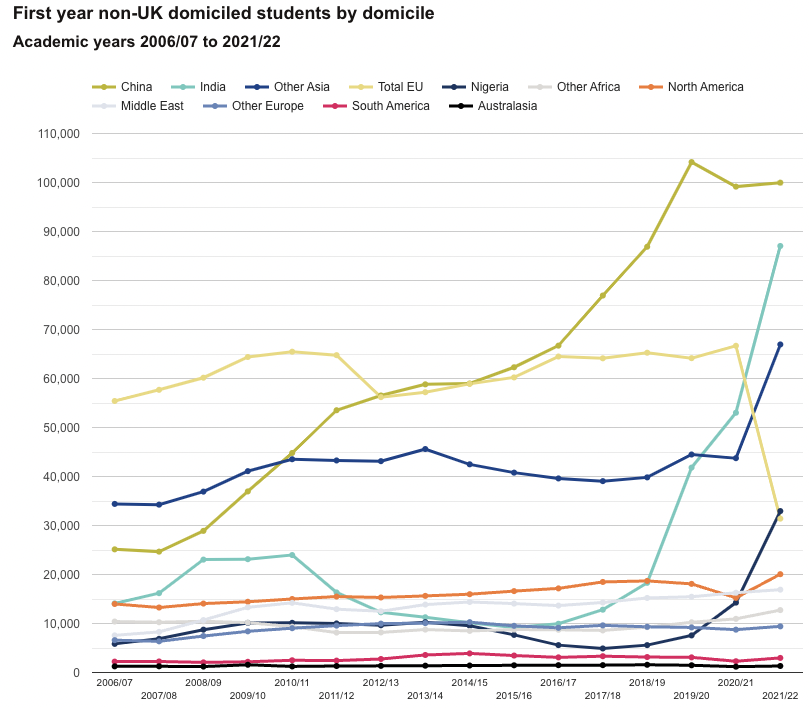Earl Blaney, The Canada Network, Canada
Canada’s international education sector has been one of the most fast-growing in the last decade, and lucrative. Despite this success, it’s also had its fair share of difficulties – one man who aims to keep the sector in check, and make sure that all those involved are working to help the international students who come to Canada, is Earl Blaney.
Notorious on LinkedIn for his provocative posts, Earl Blaney is a tireless campaigner for considerate student recruitment. Who is he and what motivates him? The PIE met with him in London, Ontario to find out.
It turns out that Blaney began his international education career in international education in the Philippines, working to recruit international students to Canada.
He returned to work in his home country – he grew up in various places in Canada including the remote town of Hornepayne, ONT (population 980) – and began recruiting for Western University in 2015.
His own business, The Canada Network, continued operations from Canada and since 2015, Blaney has been full-time in his own counselling business as a registered immigration consultant.
Working closely with international students – both in the Philippines and then by employing Filipino students in Canada – Blaney has spent years counselling and advising students.
Perhaps it was his experience of being an outsider moving to remote Hornepayne, but he displays a burning concern about sub-standard international student experience, and he was a contributor to the Fifth Estate documentary that aired last year.
“The bottom line is this,” he says. “In Canada our entire USP, and our entire international selling [proposition] at the community college level, is built on permanent residency transition based on skilled employment in Canada.
“Most people for this scheme are studying in the wrong place. Labour market demand is very regional in Canada in certain fields. So the college programs that they’re offering in Canada, may not necessarily get them a job in London – they’d be better off in Saskatchewan or Alberta. We see that all the time,” Blaney explains.
This issue, he tells The PIE, ends up stalling the whole process, and creates a worrying bottleneck of international graduates vying for a permanent residency permit that simply will not be achievable for most of them.
“Sean Fraser himself, the minister of immigration, has said in recent months, that we’re getting way too many international students who intend on doing this. We just do not have the capacity for them. So the government is aware of this issue,” he says.
Blaney has been lobbying for a long time that something is off in Canada’s international education strategy and rampant recruitment is not consistent with maintaining a strong quality of experience.
He suggests a far more shady world lurks beneath the surface of a seemingly successful international student recruitment program.
“This is not good for the immigrant, or Canada”
According to Blaney, international graduates who are not on track to receive permanent residency attempt to stay as long as they can.
Their options, he says, are to either marry someone, or to pay a less-than-legal immigration consultant upwards of $60,000 to “create” a permanent residency job – in essence, a job that keeps them on the track to PR – something Blaney has previously told The PIE.
“Fake jobs are being created. Jobs that are not even skilled jobs, with titles like ‘food service supervisor’ and ‘retail supervisor’ – and the job is not skilled in any way. A false economy is being created.
“This is not good for the immigrant, or Canada,” he comments.
Eventually the reality is many of these people get deported, and then, Blaney asks, how many international students get their dues?
“We are on the verge of a million international graduates being deported in the next three years,” he warns.
Canada’s moves with immigration and work permits in the last few months have not been tightening rules, but loosening – including extending former international students’ post-graduate work permits last year.
Blaney isn’t only cheerleading for a supportive – or realistic – policy environment for students. He continues with his work collaboration with four agents in the Philippines, one of Canada’s fastest growing international student markets.
And he has recently launched Study2Stay, a platform which evaluates an applicant’s likelihood of achieving PR based on their skills background and whichever program their agent is selecting for them.
“The evaluation handles not only eligibility for various immigration streams, but [assesses] real world likelihood of success beyond mere ‘eligibility’,” he explains.
Offered to education agents at first, the platform will also be able to be used by students in the future.
His work with Filipino agents has included helping them upscale their business, and onboarding them on certain market strategies necessary to succeed in the sector.
“[A lot of] growth for bigger companies is from new agents, so agent competency is extremely important,” he notes.
Blaney also feels it’s important to point out a glaring reality that plagues not just the Canadian system, but other countries too – the difference in student treatment depending on the source market.
“If you’re an elite class, you’ll stay in Canada, for example, if the tax rate is right and the policies are beneficial. But for people coming from somewhere like the Philippines, which is my main market, the idea is that it’s immediately better [quality of life],” he points out.
“They printed off 26,000 letters of acceptance – they’re handing them out like candy”
Essentially, Blaney explains that this whole scenario is what leads to the problem of over-enrolment, with some colleges happy to cram in the students.
This was an issue raised in the documentary revealing students protesting at being told they had to defer their start dates.
“Around 7,000 students are the capacity at one particular campus,” he relates. “3,000 at their main campus, and around 3,500 at their other: they printed off 26,000 letters of acceptance – they’re handing them out like candy,” he claims.
“I cannot imagine the immigration volume from that one college. It is alarming because not only does it impact schools that are not partaking in this method, but it stops universities looking for highly talented people.
In Blaney’s mind, nothing will change unless the government – especially immigration minister Sean Fraser – acknowledges the problem in greater detail. Recent data from the CIC confirms Blaney’s suspicions that PR is not attainable for everyone and could create the aforementioned bottleneck.
“Colleges here will never change unless [the government] do something about capping the number of letters of acceptance.
“This is a huge problem… and I think that it is really important that this information is out there,” he says.
The post Earl Blaney, The Canada Network, Canada appeared first on The PIE News.














 Some 87% of respondents felt that education is being disrupted and will evolve either through technology or new modes of delivery. “Adoption of appropriate technology” and “better hybrid delivery” were given as examples of opportunities to pursue to improve access for students globally.
Some 87% of respondents felt that education is being disrupted and will evolve either through technology or new modes of delivery. “Adoption of appropriate technology” and “better hybrid delivery” were given as examples of opportunities to pursue to improve access for students globally.